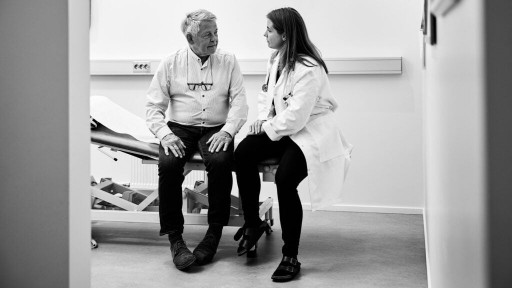
- In a new study, researchers say daily multivitamins appear to slow cognitive aging and improve memory in older adults.
- Experts explain that daily vitamins can improve a person’s overall health and gut microbiome, which can lead to better cognitive skills.
- They add that more research is needed to confirm these findings and to determine which specific vitamins are most effective.
Taking a multivitamin daily seems to improve both memory and overall cognition in older adults, according to a study published today in the American Journal of Clinical Nutrition.
The research, which was funded in part by the food and supplements manufacturer Mars Inc., was led by Chirag Vyas, an instructor in the Department of Psychiatry at Massachusetts General Hospital.
In it, researchers analyzed data on 573 individuals who were part of a larger study called the COcoa Supplement and Multivitamin Outcomes Study (COSMOS) and also were involvded in an in-clinic study of possible links between multivitamin supplements and cognitive benefits.
The researchers reported that people who took multivitamins experienced a modest benefit in global cognition over a two-year period compared to a control group that was given a placebo.
The vitamin group also saw significant improvement in episodic memory but not in executive function and attention, the researchers said.
Details from the vitamins and cognitive abilities study
Vyas and his colleagues also conducted a meta-analysis of three related studies drawn from COSMOS: the new in-clinic study and two previous studies that used telephone and online-based cognitive assessments.
The analysis showed “strong evidence” of benefits for both global cognition and episodic memory, according to the study authors, who estimated that daily multivitamin use slowed global cognitive aging by the equivalent of two years compared to a placebo.
“Cognitive decline is among the top health concerns for most older adults and a daily supplement of multivitamins has the potential as an appealing and accessible approach to slow cognitive aging,” said Vyas in a press statement. “The meta-analysis of three separate cognition studies provides strong and consistent evidence that taking a daily multivitamin, containing more than 20 essential micronutrients, helps prevent memory loss and slow down cognitive aging.”
Reaction to the vitamins and cognitive health study
“With these three studies using different approaches for assessing cognition in COSMOS, each providing support for a daily multivitamin, it is now critical to understand the mechanisms by which a daily multivitamin may protect against memory loss and cognitive decline with a focus on nutritional status and other aging-related factors,” said Howard Sesso, ScD, an associate epidemiologist at Brigham and Women’s Hospital in Massachusetts and a co-leader of the broader COSMOS study. “For example, the modifying role of baseline nutritional status on protecting against cognitive decline has been shown for the COSMOS cocoa extract intervention. A typical multivitamin such as that tested in COSMOS contains many essential vitamins and minerals that could explain its potential benefits.”
“The lack of essential nutrients in older adults may increase their risk of cognitive decline, including memory loss. Vitamins are crucial for various cognitive functions, including memory creation and preservation,” she added.
“In general, we know there is a link between nutrition and cognitive health; both linked through the health of gut bacteria,” he told Medical News Today. “In theory, healthy diets lead to better gut bacteria, which in turn leads to improved cognitive health. The opposite is likely true for people with poor diets. Although we need more research to definitively prove this link, the old adage ‘you are what you eat’ is powerful advice.”
In terms of brain processes, “vitamins play a crucial role in supporting cognitive health through their involvement in various biological pathways,” Vyas told Medical News Today. “Some of the essential processes include the maintenance of neuronal membranes, regulation of neurotransmitter release, and protection against oxidative stress.”
Which vitamins work remains a mystery
However, Vyas said, researchers were unable to pinpoint which specific vitamins in the daily supplements had a positive effect on brain health, indicating that further research is needed.
Dr. Yuko Hara, the director of Aging and Alzheimer’s Prevention at the Alzheimer’s Drug Discovery Foundation who was not involved in the study, told Medical News Today that past studies have shown that adhering to a Mediterranean-style diet is associated with better memory, larger volumes of brain regions important for memory functions (e.g., the hippocampus), and lower levels of biological markers of Alzheimer’s disease.
“In general, clinical trials of individual vitamins, like vitamin C, E, have not been successful in slowing cognitive decline or improving cognitive function,” Hara said. “The vitamins that play the greatest role in cognitive health may be different across people and may depend on which vitamins you are deficient in. For many people, supplementing vitamins when they already have adequate levels from their diet is unlikely to be beneficial and may be harmful when taken in excess.”
“There are now positive, large-scale, long-term studies that show that multivitamin-mineral supplementation for older adults may slow cognitive aging,” added Claire Sexton, DPhil, the senior director of scientific programs and outreach for the Alzheimer’s Association who was not involved in the study. “While there are multiple biological pathways that may link multivitamin supplementation to cognition, this study does not provide additional data on such mechanisms.”
More research needed on vitamins’ benefits
Sexton told Medical News Today that more research is needed before the Alzheimer’s Association is ready to recommend widespread use of a multivitamin supplement to reduce the risk of cognitive decline in older adults.
“Independent confirmatory studies are needed in larger, more diverse and representative study populations,” she said.
She noted that the COSMOS clinic study had less than 2% non-white participants in the multivitamin group and 5% non-white participants in the placebo group.
Nonetheless, Vyas said that “apart from the three COSMOS cognitive studies (COSMOS-Clinic, COSMOS-Mind, and COSMOS-Web), no other studies in the existing literature had all these elements: conducted cognitive assessments at the time of study enrollment and during the treatment follow-up; tested a comprehensive multivitamin-mineral supplement containing at least 20 essential vitamins and minerals; assessed interventions lasting 12 months or more; and included a sufficiently large number of participants [at least 500].”





